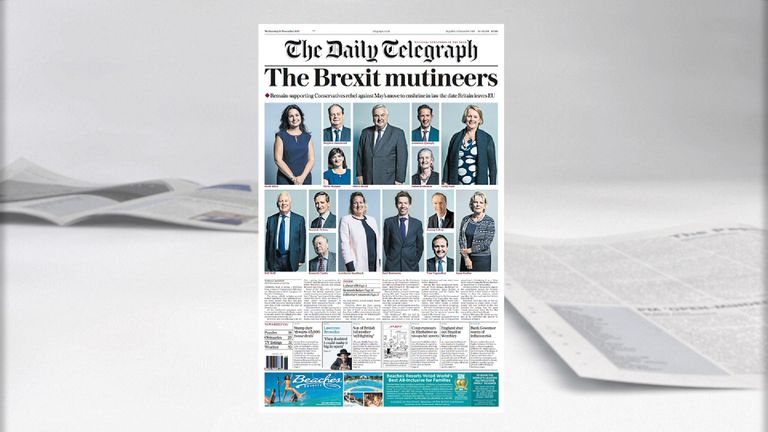Tory MPs hit back at Daily Telegraph over 'Brexit mutineers' front page
Former ministers and rising stars unite to say the newspaper is "misleading" readers, defending their votes on the Brexit Bill.
Thursday 16 November 2017 14:16, UK
Over a dozen Tory MPs have launched a fiery counter-offensive after being branded "Brexit mutineers" by the Daily Telegraph.
The group of backbenchers, which includes several former ministers, defended voting for amendments to the EU Withdrawal Bill and accused the newspaper of "misleading" readers.
They said defying the Government's own addition to enshrine the exact date and time of Brexit looked like an "uncontroversial proposal" but could "accidentally harm our country's interest".
"Putting a date in law is too rigid," the group wrote in a letter to the Telegraph published on Thursday.
"As negotiations reach their close, the Government may need a small amount of additional time to conclude, for example, the best transitional deal."
The signatories include Tory MPs with a history of challenging their own party leadership, including Ken Clarke, Heidi Allen and Anna Soubry.
Fifteen MPs their pictures and names splashed on the front page of Wednesday's Telegraph under the headline: "The Brexit mutineers."
They added in their reply: "We are pleased Conservative colleagues from across the Brexit divide accept our intentions are genuine and note that some are disappointed you didn't include them in our number."
It comes after Ms Soubry revealed she had been forced to report at least five threats to the police following the newspaper's front page being published.
Brexit minister Steve Baker also expressed "regret" at "media attempts to divide our party".
Tensions are running high in Westminster as the Brexit Bill cleared its third day of reading in committee stage - where hundreds of amendments have been tabled.
The Government has avoided defeat so far, but could run into trouble over Tory proposed changes, including those calling for MPs to get a "meaningful vote" on the final exit deal to be enshrined in primary legislation and revoking provisions for so-called 'Henry VIII' powers.


